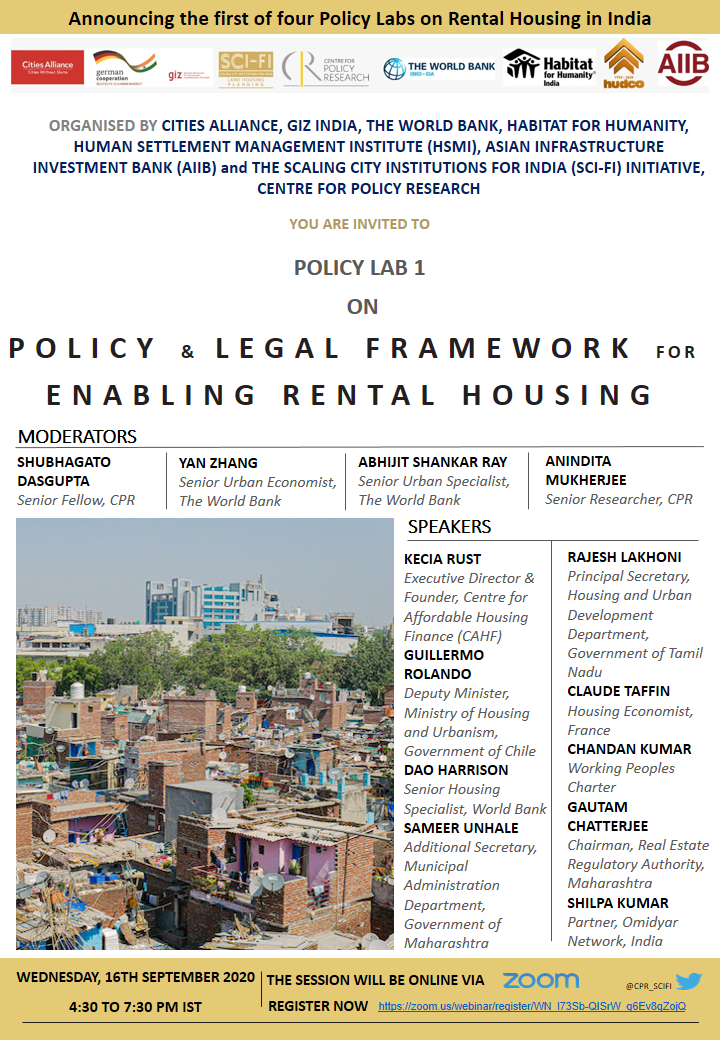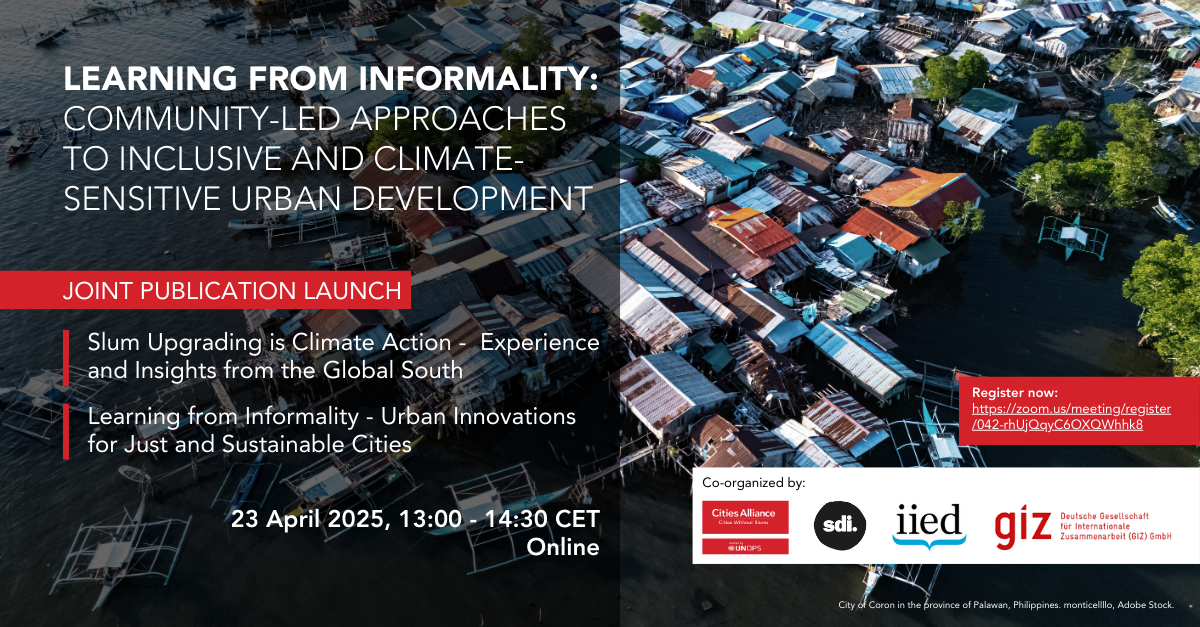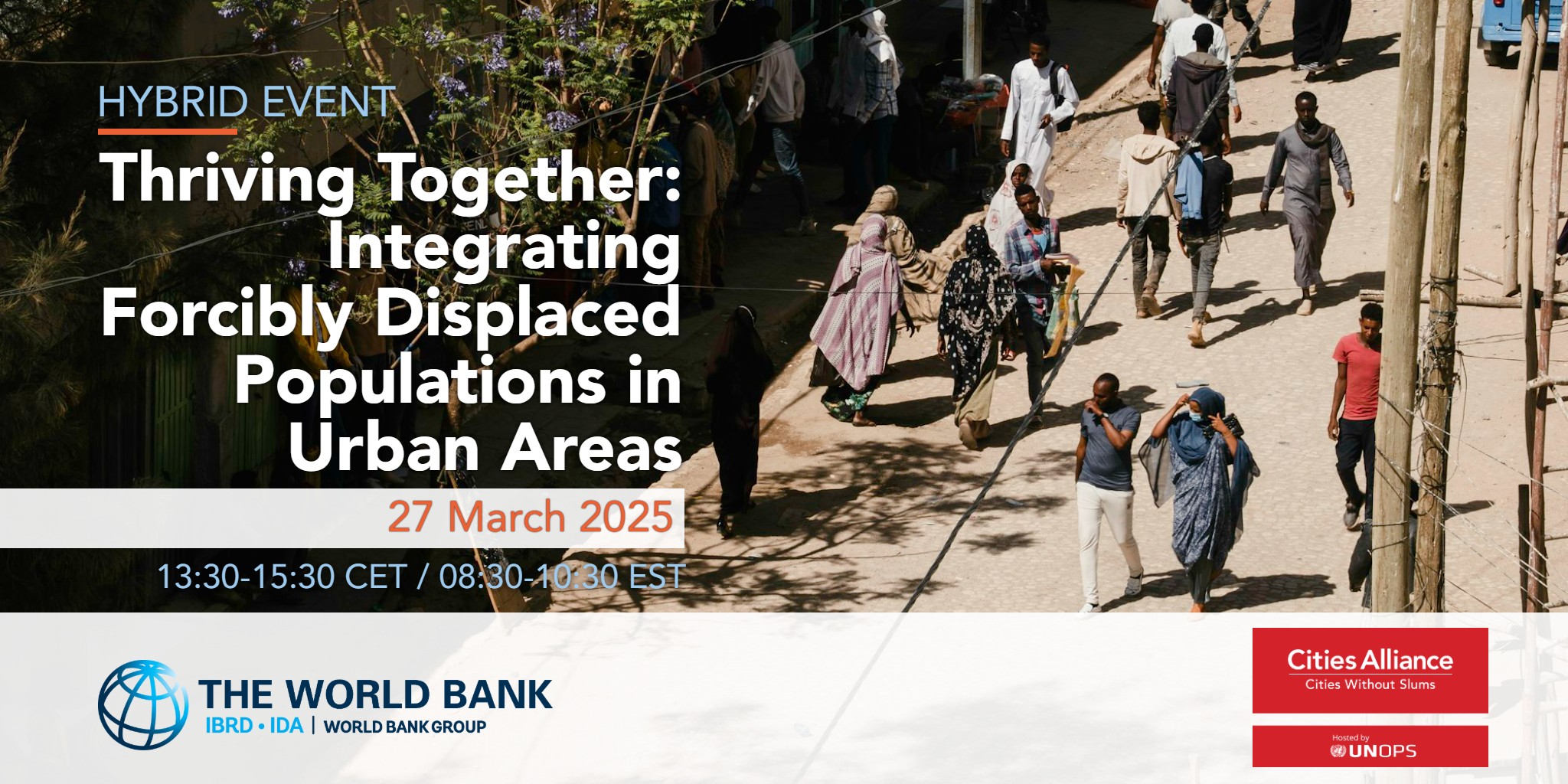- Who We Are
- How We Work
- Regional / Country Initiatives
- Legacy
- Core Themes
- Working Groups
- Portfolio & Results
- Newsroom
- Resources
Policy Lab 1 India: Policy & Legal Framework for Rental Housing

An Indian perspective. Case studies from Chile, South Africa & Indonesia.
Setting the Context
Despite one-third of the urban population residing in rental accommodation, and renting being the only option for low income migrant workers and poorer populations in cities, rental housing remains under-addressed in the country’s policy and legal paradigm. The mass exodus of migrant workers prompted by a nationwide lockdown as a containment strategy for the COVID-19 pandemic not only highlighted the destitution of the migrant workers within the cities, but also their lack of housing security. Recognising this, the Government of India initiated the Affordable Rental Housing Complexes (ARHCs), a sub-scheme under Pradhan Mantri AWAS Yojana - Urban (PMAY-U), aiming to provide access to affordable rental housing to urban migrants/poor.
Through till the 1990s the government’s endeavour to bridge the gap between the supply and demand for housing by the urban poor was to: improve their affordability for owning a house by implementing subsidised public housing schemes; and, for rental housing by promulgating Rent Control Acts (RCA) to protect them from steep increments in rentals and forced evictions.
By the turn of the century it was clear that this approach was not meeting demand and that the RCAs disincentivised house-owners from renting out their units, thereby limiting the supply of rental housing stock. Furthering this new approach, the national government leveraged the JNNURM program in 2005 and incentivised states to reform their RCAs. It was however another decade before the national government took on the drafting of a policy framework exclusively targeting rental housing with the formation of a Task Force under the Ministry of Housing and Urban Poverty Alleviation (now MoHUA). While still to be approved and operationalised, the objective of the NURHP has been to adopt a systematic and balanced approach to rental housing and encourage it as an additional housing option to support the future growth in India. The proposed NURHP also recommended the formulation of a Draft Model Tenancy Act (MTA) to efficiently and transparently regulate the renting of premises and balance the interests of owners and tenants, although it remained as a draft as on 2019.
Despite a national policy vacuum, some Indian states have managed to implement a policy and legislative framework in the affordable rental housing spheres with varying results. Addressing the changing status of real estate and the overall urban paradigm, the state of Tamil Nadu enacted the Tamil Nadu Regulation of Rights and Responsibilities of Landlords and Tenants Act, 2017 (New Tenancy Act), which came into force in 2019. By aiming to regulate rent as agreed between the landlord and the tenant and formalising the rental markets, the Act is a progressive step towards addressing the bottlenecks of the erstwhile rent control legislation and creating more inclusive rental housing markets. In another example from Mumbai, Maharashtra, the Mumbai Metropolitan Development Authority (MMRDA) launched the Rental Housing Scheme in 2008, aiming to create rental housing units for EWS and LIG households. Subsequently, the scheme was replaced by the Maharashtra Affordable Housing Scheme in 2014 which primarily focused on ownership housing.
As the COVID-19 pandemic has unveiled the gruesome hardships faced by the migrants and the urban poor, especially in terms of access to safe and affordable rental housing, a Rental Housing Lab Series is formulated to provide a platform for deepening the policy dialogue on rental housing in order to influence the approval and operationalisation of the rental housing policy, legislation and regulation at the national and state levels.
An important point of departure for this Rental Housing Lab Series is the recognition that the majority of the affordable rental housing is provided by private landlords (formally or often informally) and that housing is essentially a private good that is best provided by the market. Today, the government’s role is therefore focused on (i) establishing an enabling environment for the private sector (including private individuals) to deliver housing; (ii) addressing the market failures; and (iii) avoiding and/or correcting government policy failures.
This first Policy Lab of the series aims to discuss the viability of the policy and legal interventions thus far concerning the functioning of rental housing markets in India for the urban poor. It recognises that a robust understanding of the policy and legal framework surrounding the rental housing markets in India would also emerge from understanding the position of the binding constraints for market-based rental housing supply across the entire rental housing value chain. On the supply side of the value chain, factors include access to land (security, tradability and enforceability of land tenure), infrastructure and services provision, planning and building regulations, building materials industry, access to developer finance. On the demand side, factors include preference and effective demands of tenants. Furthermore, the availability and quality of public asset management and rental property management plays an important role in rental housing markets.
There is a wide array of policy, legal and regulatory instruments – both on the supply and demand side – that have been applied in countries around the world. Leveraging learnings from international experience, this Webinar also aims to open up the space for critically examining the policy, legal and regulatory instruments which can be devised and/or revised to establish an enabling environment for formal private rental housing suppliers to expand their market to the affordable housing space, or for informal housing suppliers to move into the formal processes without jeopardising affordability.

Key questions that need to be considered in designing an inclusive rental housing policy and legal framework, would include:
- How do we assess the functioning of the rental housing markets? Where are the market failures? How to best identify binding constraints in market provision of rental housing?
- How do we decide the package of interventions – supply side instruments (direct delivery in the form of public rental, tax and fee reduction/exemption on the part of developer or landlord to reduce the production cost, efficiency of dispute resolution, etc.); and/or demand side instruments (rental voucher/allowances)? What has worked and not worked, particularly measured against the cost-benefit and fiscal sustainability of such instruments?
- What have been the innovations with respect to policy/legal/regulatory instruments to enable rental housing provisions across various income groups, formalise the informal supply to protect tenants’ rights and better integrate affordable rental housing into the overall housing and city planning process?
- How have countries bridged the affordable rental gaps in light of COVID-19?
Structure of the Sessions in the Lab
- International Experience in Rental Housing Policy and Legal Frameworks: This section aims to discuss the innovative approaches in affordable rental housing policies and legislative frameworks adopted by various developing countries. It aims to also discuss the implications of the existing/new policies introduced, the role of the stakeholders and the factors contributing to their successful implementation. The session will also discuss the experience of some Indian states which have attempted to formalise their rental housing markets through a dedicated framework for rental housing.
- Panel Discussion – Discussion with Academicians/sector experts: This session aims to deliberate on the current status of rental housing in India, viz-a-vis learnings from the international experience, as discussed in the first session. It aims to outline the most pertinent roadblocks towards streamlining the Indian rental housing market, and recommend the potential solutions to address the same.
A detailed agenda for the Policy Lab 1 is enclosed below.
POLICY LAB 1
Policy & Legal Framework for Enabling Rental Housing
|
Time |
Thematic Areas |
Speaker |
|
|
16:30 –16:35 |
Opening Remarks |
Anindita Mukherjee Senior Researcher, CPR |
|
|
16:35 –16:50 |
Analysis of the current rental housing policy and legal framework in India |
Shubhagato Dasgupta, Senior Fellow, CPR |
|
|
16:50 –18:35 |
Moderated by: Yan Zhang, Senior Urban Economist, and Abhijit Shankar Ray, Senior Urban Specialist, World Bank |
||
|
This session will lay out various relevant country experiences in the space of rental housing policies and legal framework. It will discuss the adaption of various countries to the changing urban paradigm and their subsequent creation of inclusive approaches to rental housing. The session will also discuss the scope and the results of rental housing policies/legislation implemented by some Indian states |
|||
|
16:50 –17:05 |
South Africa has recently broadened its perspectives on rental housing market by better understanding private rental housing delivery. CAHF has recently developed a methodology for understanding and quantifying rental markets in Africa. This presentation will use the rental housing value chain to help laying a foundation of a comparative discussion. |
Kecia Rust, Executive Director & Founder, Centre for Affordable Housing Finance (CAHF) |
|
|
17:05 –17:20 |
Chile has pioneered the introduction of a large-scale rental housing subsidy programme. This framework is a shift from its erstwhile focus on ownership driven housing models, and caters to low- and moderate-income young families. It pioneered the first demand-side rental subsidy programme in developing countries with demonstrable success. |
Guillermo Rolando, Deputy Minister, Ministry of Housing and Urbanism, Government of Chille
|
|
|
17:20 –17:35 |
Indonesia introduced affordable rental housing program in the form of subsidised rental housing units for low income groups who were residing in informal housing without tenure security. The presentation will make a candid assessment of its success, failure, and lessons learned. |
Dao Harrison, Senior Housing Specialist, World Bank |
|
|
17:35 –17:50 |
Q&A Moderated by: Yan Zhang, Senior Urban Economist, World Bank |
||
|
17:50 –18:05 |
Rental Housing Scheme, 2011-2014 |
Sameer Unhale, Additional Secretary, Municipal Administration Department, Government of Maharashtra |
|
|
18:05 –18:20 |
Tamil Nadu Tenancy Law, 2019 |
Rajesh Lakhoni, Principal Secretary, Housing and Urban Development Department, Government of Tamil Nadu |
|
|
18:20 –18:35 |
Q&A Moderated by: Abhijit Shankar Ray, Senior Urban Specialist, World Bank |
||
|
18:35 –19:10
|
Moderated by: Shubhagato Dasgupta, Senior Fellow, CPR |
||
|
This session will discuss the opportunities for India to adopt learnings from international experience in developing inclusive and affordable rental housing frameworks |
|||
|
18:35 –19:10
|
|
||
|
Q&A Moderated by: Anindita Mukherjee, Senior Researcher, CPR |
|||
|
19:10 –19:15 |
Closing Remarks |
Anindita Mukherjee, Senior Researcher, CPR |
|





